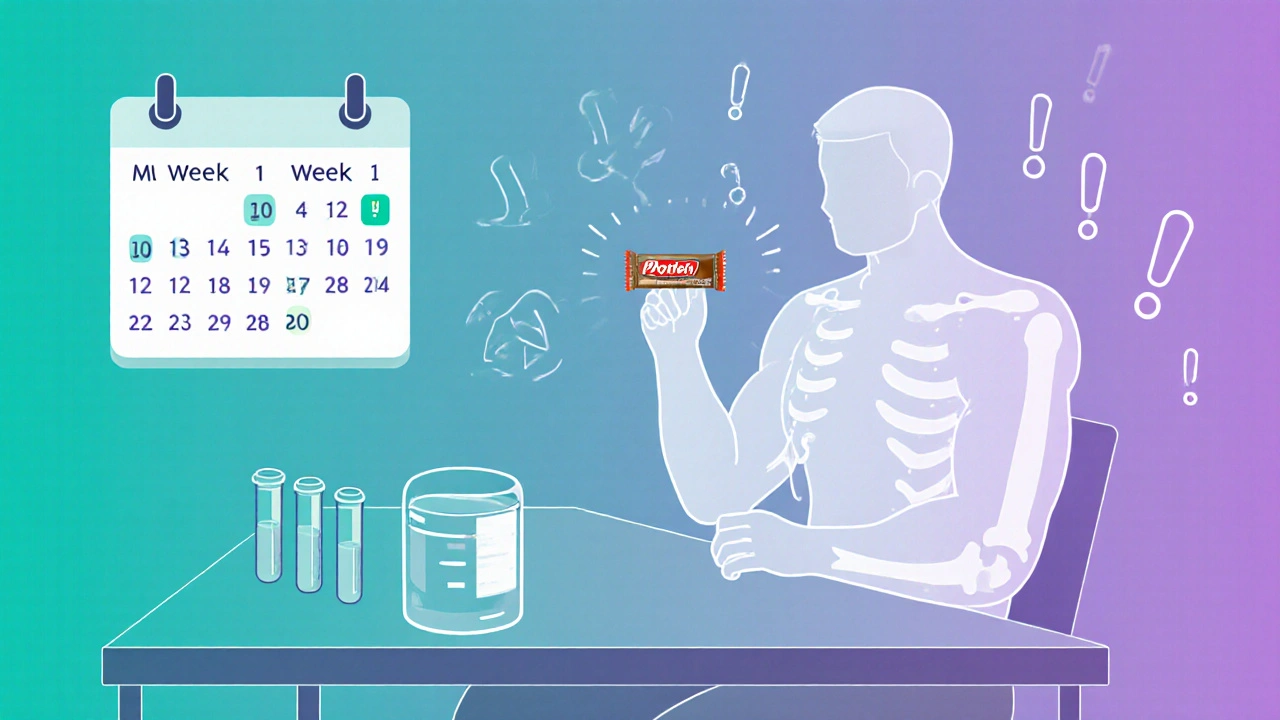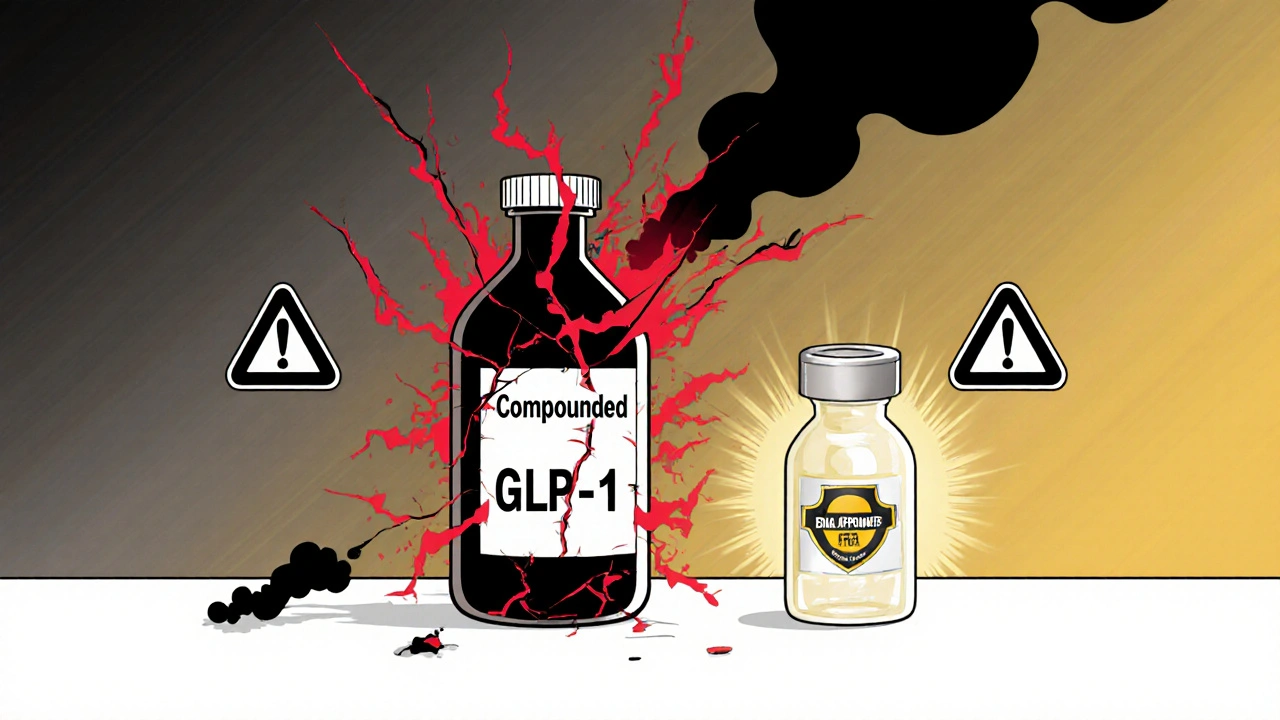Next-Generation GLP-1 Agents: What You Need to Know About Safety and Side Effects

GLP-1 Side Effect Risk Calculator
Personal Risk Assessment
Enter your health information below to understand potential side effects and risks associated with next-generation GLP-1 treatments.
Gastrointestinal Side Effects
Long-Term Health Risks
Critical Warning
Compounded GLP-1 drugs pose significant safety risks including inconsistent dosing, contamination, and severe adverse events. FDA-approved medications from licensed pharmacies are the only safe option.
When you hear about GLP-1 agonists these days, it’s not just about diabetes anymore. These drugs have become the most talked-about weight loss tools in modern medicine. But as newer versions hit the market-some promising over 20% body weight loss-questions about safety are growing louder. What are the real risks? Are the side effects worse than the old ones? And should you be worried about compounded versions sold online?
What Are Next-Generation GLP-1 Agents?
GLP-1 receptor agonists mimic a natural hormone in your gut that tells your brain you’re full, slows digestion, and helps your pancreas release insulin. The first one, exenatide, came out in 2005. Today, we’re seeing a new wave: drugs that don’t just target GLP-1, but also GIP and glucagon receptors at the same time. These are called dual and triple agonists.
Take retatrutide from Eli Lilly. It’s a triple agonist-hitting GLP-1, GIP, and glucagon receptors. In Phase II trials, people lost up to 24.2% of their body weight after 48 weeks. That’s more than most people lose with bariatric surgery. Then there’s orforglipron, the first oral GLP-1 agonist to show real results. In trials, it cut waist size by up to 10 cm and lowered blood pressure without injections. VK2735 from Viking Therapeutics, another dual agonist similar to tirzepatide, dropped weight by nearly 15% in just 13 weeks.
These aren’t just better versions of semaglutide or liraglutide. They’re designed to work harder, last longer, and hit more targets in your metabolism. But that power comes with new questions-especially about what happens to your body when you lose weight this fast.
Common Side Effects: Nausea, Vomiting, and the GI Rollercoaster
If you’ve ever tried semaglutide or liraglutide, you know the drill: nausea, vomiting, diarrhea, constipation. These aren’t rare. Up to 50% of people on older GLP-1 drugs get them. And guess what? The newer ones? They’re not better.
A 2025 study in PubMed found that even though dual and triple agonists were supposed to reduce gastrointestinal issues by balancing hormone effects, they didn’t. Nausea still hit 30-35% of users. Vomiting? Still 10-15%. Diarrhea and constipation stayed in the 10-20% range. Orforglipron’s side effects? The makers called them "mild to moderate"-but that’s still a lot of people feeling sick.
The good news? Most of these symptoms fade. Clinical trials show 70-80% of patients see improvement within 4 to 8 weeks if they stick with the dose. The trick is going slow. Doctors now recommend taking 16 to 20 weeks to reach the full dose. Rushing it doesn’t just make you feel worse-it increases the chance you’ll quit.
The Hidden Risks: Muscle, Bone, and Long-Term Unknowns
Losing 20% of your body weight sounds amazing-until you realize how much of that might be muscle, not fat. Dr. Daniel J. Drucker, a leading endocrinologist at the University of Toronto, warned in his 2025 review that rapid weight loss from these drugs could hurt muscle mass and bone density. That’s not just a concern for older adults. Even younger, active people could lose strength without proper protein intake and resistance training.
There’s also the question of what happens after five years. No one knows yet. The longest trials so far run two to three years. But if you’re taking this drug for obesity, you might need it for life. The American Gastroenterological Association still lists pancreatitis as a "theoretical risk," even though no clear link has been proven. And while heart risks have dropped in trials, long-term data on kidney, liver, and brain health is still missing.
One of the biggest unknowns is nutritional status. When your appetite drops this much, you might not eat enough vitamins or minerals. Iron, B12, calcium, and vitamin D levels need monitoring. Many patients don’t realize this until they feel fatigued or develop anemia.

Compounded GLP-1 Drugs: A Dangerous Shortcut
If you’ve seen ads for "semaglutide" or "tirzepatide" on Instagram or TikTok, chances are it’s not real. Compounded versions-made in small pharmacies without FDA oversight-are flooding the market. The University of Illinois at Chicago’s Digital Pharmacy issued a stark warning in August 2025: these products are unsafe.
Why? Because they’re not standardized. One vial might have 10% of the labeled dose. Another might have 30% more. Some contain contaminants. Patients have reported dizziness, fainting, heart palpitations, and even hospitalizations from these versions. The FDA has issued multiple alerts since 2024. And the data shows non-compliant compounding pharmacies have 3 to 5 times more adverse events than FDA-approved ones.
There’s no substitute for FDA-approved drugs. If you’re prescribed one, get it from a licensed pharmacy. If you’re buying online without a prescription, you’re gambling with your health.
Who Should Avoid These Drugs?
These aren’t magic pills for everyone. People with a personal or family history of medullary thyroid cancer or multiple endocrine neoplasia type 2 should avoid GLP-1 agonists entirely-there’s a known risk of thyroid tumors in animal studies. Pregnant women or those planning pregnancy should pause treatment. The effects on fetal development aren’t studied enough.
People with severe gastrointestinal disorders like gastroparesis or chronic intestinal pseudo-obstruction should also be cautious. Slowing digestion further could make things worse. And if you’ve had pancreatitis before, your doctor may recommend against it, even if the link isn’t proven.
Finally, if you’re underweight or have an eating disorder, these drugs are not appropriate. They’re meant for obesity, not appetite suppression for healthy people.

What’s Coming Next?
By the end of 2025, Eli Lilly’s retatrutide should complete its Phase III trials. If approved, it could be the first GLP-1 drug approved specifically for weight loss with over 20% average results. Viking Therapeutics is pushing ahead with VK2735’s oral version, hoping to beat injectables on tolerability. Merck’s danuglipron and oral orforglipron could offer non-injection options by 2026.
Researchers are also testing these drugs for conditions beyond weight and diabetes-like fatty liver disease, Parkinson’s, and even depression. But each new use brings new safety questions. Will a drug that helps your brain feel full also affect your mood? Will it change how your liver processes toxins? These studies are just starting.
The global market for these drugs is expected to hit $120 billion by 2030. That means more research, more data, and more options. But it also means more pressure to rush approvals. The key will be balancing speed with safety.
What Should You Do?
If you’re considering one of these drugs:
- Get it from a licensed pharmacy with a valid prescription.
- Ask your doctor about your muscle mass and bone health before starting.
- Plan for regular blood tests to check vitamin levels, kidney, and liver function.
- Be patient with side effects-they usually get better.
- Don’t skip protein or strength training. You’ll lose muscle if you don’t fight for it.
- Watch for signs of gallstones, rapid heart rate, or severe abdominal pain. Call your doctor.
These drugs are powerful. But they’re not risk-free. The best results come from combining them with lifestyle changes-not replacing them.
Are next-generation GLP-1 agents safer than older ones like semaglutide?
No, not necessarily. While newer drugs like retatrutide and VK2735 are more effective at weight loss, their side effect profiles are very similar to older agents. Nausea, vomiting, and diarrhea remain common, and there’s no evidence yet that multi-receptor agonists reduce gastrointestinal issues. The main difference is the speed and amount of weight loss, which introduces new concerns like muscle loss and nutritional deficits.
Can I take oral GLP-1 drugs like orforglipron instead of injections?
Yes, oral options like orforglipron are approved and effective. They work just as well as injectables for weight loss and blood sugar control, with similar side effects. The biggest advantage is convenience-no needles. But they still require careful dosing and gradual titration to avoid stomach upset. Not everyone absorbs them the same way, so effectiveness can vary.
Why are compounded GLP-1 drugs dangerous?
Compounded GLP-1 drugs aren’t tested for purity, strength, or consistency. One dose might be too weak to work. Another might be dangerously strong, causing severe nausea, low blood sugar, or even heart issues. The FDA has warned that non-approved versions have caused hospitalizations. Only FDA-approved products from licensed pharmacies should be used.
How long do side effects last with these drugs?
Most gastrointestinal side effects improve within 4 to 8 weeks if you stay on the same dose. Nausea and vomiting tend to fade first, followed by constipation or diarrhea. If symptoms persist beyond 8 weeks or get worse, talk to your doctor. You may need to adjust your dose or rule out other causes like gallbladder issues or food intolerances.
Do these drugs cause muscle loss?
Yes, rapid weight loss from GLP-1 agents can lead to muscle loss, especially if protein intake is low or you’re not doing strength training. Studies show up to 30% of weight lost on high-dose agents can come from muscle, not fat. To protect muscle, aim for 1.6-2.2 grams of protein per kilogram of body weight daily and include resistance exercises at least twice a week.
Are GLP-1 drugs safe for long-term use?
We don’t know yet. Most trials last 1-2 years. The long-term effects of losing 20%+ body weight over 5-10 years are still being studied. Potential concerns include bone density loss, nutritional deficiencies, and changes in metabolism. Regular monitoring and lifestyle support are essential for anyone planning to use these drugs long-term.




Brandy Walley
lol so now we’re supposed to be scared of weight loss drugs but not of the 500 calorie days people do on tiktok? 🤡
shreyas yashas
i’ve been on orforglipron for 12 weeks. nausea was brutal at first but honestly? it faded. i lost 18% body fat. i lift 3x a week and eat 2g protein per kg. no muscle loss. no hospital trips. just slow progress. if you’re worried about side effects, start low and go slow. no magic pills, just science with patience.
Suresh Ramaiyan
it’s funny how we treat these drugs like they’re either demons or miracles. they’re tools. like a hammer. you can use it to build a house or smash a window. the problem isn’t the drug-it’s the culture around it. people chasing 20% weight loss like it’s a trophy, ignoring muscle, nutrition, mental health. we need to stop glorifying rapid loss and start honoring sustainable change. the science is advanced, but our mindset? still stuck in the 90s diet craze.
Katy Bell
i had a friend go on a compounded version she bought off ig. ended up in the er with heart palpitations and a blood sugar crash. she cried saying she just wanted to "feel normal again." like… we’re not talking about a new lipstick here. this is your body. please just get the real stuff from your doctor. no one’s judging you for needing help. but please don’t gamble with your health on a random website.
Ragini Sharma
sooo… if i take these drugs and dont eat protein, i lose muscle? shocking. next youll tell me water is wet. i mean, really? we need a whole article to say "dont be dumb"? 🙄
Linda Rosie
The FDA’s warning regarding compounded GLP-1 agents is unequivocally supported by empirical data. Unauthorized formulations pose unacceptable risks to public health.
Vivian C Martinez
if you’re thinking about starting one of these, don’t panic. talk to your doctor, get your labs done, and focus on moving your body. protein + weights = your best defense against muscle loss. you don’t need to be perfect. just consistent. and please, for the love of all things holy, don’t buy stuff off instagram. i’ve seen too many people regret that choice.
Ross Ruprecht
why are people so obsessed with losing weight? just eat less and move more. these drugs are just a crutch for lazy people who don’t want to actually change their lives.
Bryson Carroll
the real issue isnt the drugs its the fact that we’ve turned medicine into a commodity for the rich who think theyre entitled to a perfect body. meanwhile the poor are dying from diabetes because they cant afford insulin. so yeah lets talk about retatrutide while people are choosing between food and meds